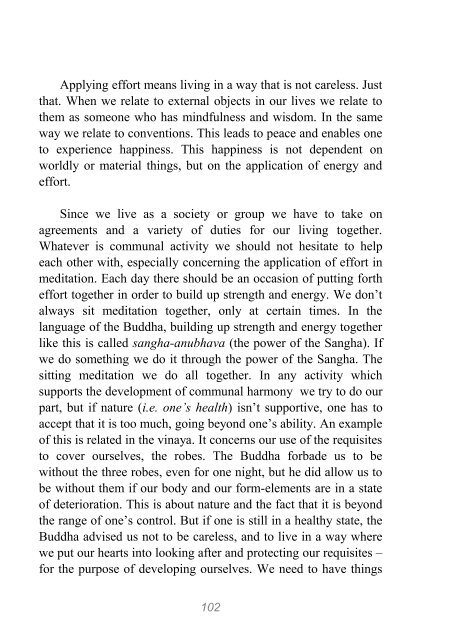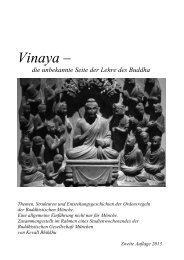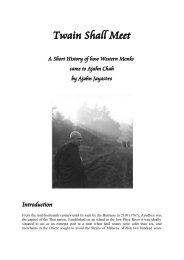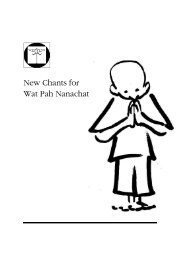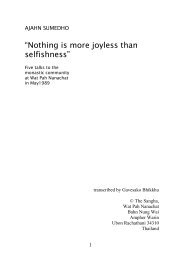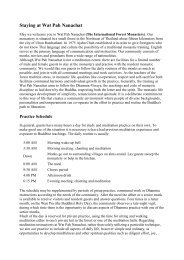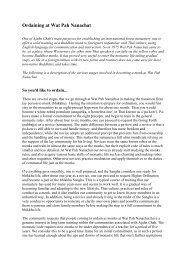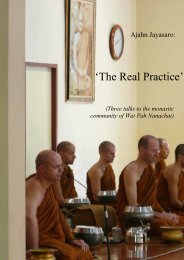Luang Por Liem: The Ways of the Peaceful - Wat Pah Nanachat
Luang Por Liem: The Ways of the Peaceful - Wat Pah Nanachat
Luang Por Liem: The Ways of the Peaceful - Wat Pah Nanachat
Create successful ePaper yourself
Turn your PDF publications into a flip-book with our unique Google optimized e-Paper software.
Applying effort means living in a way that is not careless. Just<br />
that. When we relate to external objects in our lives we relate to<br />
<strong>the</strong>m as someone who has mindfulness and wisdom. In <strong>the</strong> same<br />
way we relate to conventions. This leads to peace and enables one<br />
to experience happiness. This happiness is not dependent on<br />
worldly or material things, but on <strong>the</strong> application <strong>of</strong> energy and<br />
effort.<br />
Since we live as a society or group we have to take on<br />
agreements and a variety <strong>of</strong> duties for our living toge<strong>the</strong>r.<br />
Whatever is communal activity we should not hesitate to help<br />
each o<strong>the</strong>r with, especially concerning <strong>the</strong> application <strong>of</strong> effort in<br />
meditation. Each day <strong>the</strong>re should be an occasion <strong>of</strong> putting forth<br />
effort toge<strong>the</strong>r in order to build up strength and energy. We don’t<br />
always sit meditation toge<strong>the</strong>r, only at certain times. In <strong>the</strong><br />
language <strong>of</strong> <strong>the</strong> Buddha, building up strength and energy toge<strong>the</strong>r<br />
like this is called sangha-anubhava (<strong>the</strong> power <strong>of</strong> <strong>the</strong> Sangha). If<br />
we do something we do it through <strong>the</strong> power <strong>of</strong> <strong>the</strong> Sangha. <strong>The</strong><br />
sitting meditation we do all toge<strong>the</strong>r. In any activity which<br />
supports <strong>the</strong> development <strong>of</strong> communal harmony we try to do our<br />
part, but if nature (i.e. one’s health) isn’t supportive, one has to<br />
accept that it is too much, going beyond one’s ability. An example<br />
<strong>of</strong> this is related in <strong>the</strong> vinaya. It concerns our use <strong>of</strong> <strong>the</strong> requisites<br />
to cover ourselves, <strong>the</strong> robes. <strong>The</strong> Buddha forbade us to be<br />
without <strong>the</strong> three robes, even for one night, but he did allow us to<br />
be without <strong>the</strong>m if our body and our form-elements are in a state<br />
<strong>of</strong> deterioration. This is about nature and <strong>the</strong> fact that it is beyond<br />
<strong>the</strong> range <strong>of</strong> one’s control. But if one is still in a healthy state, <strong>the</strong><br />
Buddha advised us not to be careless, and to live in a way where<br />
we put our hearts into looking after and protecting our requisites –<br />
for <strong>the</strong> purpose <strong>of</strong> developing ourselves. We need to have things<br />
102


